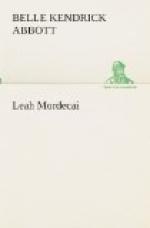Leah had long since acquainted Lizzie with the consummation of her fears, informing her of the engagement between Mark Abrams and her sister Sarah. With this information—this avowal of her broken heart and hopes—Leah had enshrouded the subject with silence and laid it away, as we lay our treasures in the tomb. Lizzie, always compassionate and discreet, made no mention of it; and so the silence was unbroken as the days passed on.
In the Citadel Square, far above Madam Truxton’s seminary, the drilling, drilling, drilling, was daily going on in these sunny days. Drilling, drilling, drilling—for the coming battle of life, or for the crimson strife of war that might desolate a land. Which was it? Only the veiled years could answer this inquiry. Meanwhile, the drilling still went on.
High hopes filled manly bosoms, and ambitious hearts throbbed wildly, as the approaching end of the military year drew nigh.
Emile Le Grande sat dozing in his private chamber late one evening, at the close of a severe day’s duty, seated in a capacious arm-chair, with his head dropped upon his breast. The young man was dozing over the journal that he held in his unconscious grasp. Had one stolen beside him and looked down, he might have read the following entries, beginning many months previous to this evening.
“January.—I have seen the fair Leah but three times since Bertha Levy’s tea-party, yet I have passed her house daily for that purpose ever since. Zounds! It’s an ill fate, I swear! . . .
“February.—How my heart beat to-day, as I was walking arm-in-arm with George Marshall, and we suddenly confronted the beautiful Jewess as she was turning into Prince street.
“’What a magnificent face, Emile! What Hebrew maiden is that bowing to you?’
“‘Miss Mordecai,’ I proudly replied, ’the Jewish banker’s daughter, of whom you have heard me speak before.’
“’Yes, certainly. Well, she is beautiful. You seem a little bewitched, boy,’, he said. And I said—nothing.
“March.—I am more and more perplexed. The Jewess is at the bottom of it all. To-day I hinted to Helen something of my fancy for Leah Mordecai. She only laughed. I was irritated by her ridicule, and I told her I intended to marry Leah if I could. Her silly reply was, ‘Well, suppose you can’t?’ School-girls are intolerably silly, at Helen’s age! She thinks now of nothing and nobody but Henry Packard, and he’s the stupidest cadet in the institute—everybody knows that. I wish I had a sister that could sympathize with me. Wh-e-e-w! I am altogether out of sorts. Maybe I’ll be all right to-morrow.
“April.—Prof. Brown said to-day that I was not studying hard enough, and if I did not spur up I should come out shabbily at the end of the term.




